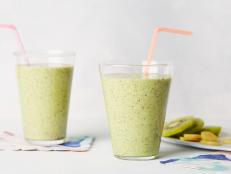5 Common Diabetes Nutrition Myths a Dietitian Wants You To Put To Rest
Plus, practical strategies to try instead.

Andriy Onufriyenko/Getty Images
For people living with diabetes, one of the most important aspects of maintaining blood sugars within a healthy range is making informed nutrition choices. There is so much information out there, and it can be hard to decipher what’s right for you and what you should leave behind. With fad diets on the rise, many people are left not knowing what information to trust or where to seek support. Here are five of the most common misconceptions I’ve come across as a dietitian, plus practical strategies to try instead.
Myth: Avoiding Carbs Will Improve My Diabetes
I can’t tell you how many times I’ve had newly diagnosed patients tell me they’ve eliminated all carbs thinking this will help them manage their diabetes. Carbohydrates have a bad reputation when it comes to diabetes because they cause the biggest increase in blood glucose, but they are actually an important part of a balanced diet. Carbohydrates are a piece of the puzzle when it comes to balancing blood sugar and work best when combined with protein, fat and fiber. Carbohydrates are converted to glucose to provide our bodies with energy, so much so that if we don’t eat carbohydrates our body undergoes a complicated pathway to make glucose from other nutrients. Carbohydrates are the body’s primary source of energy, and a complete elimination of this macronutrient can lead to fatigue, nutrient deficiencies and an imbalance in the overall diet. Additionally, such a restrictive approach is often hard to maintain over the long term, since it limits food choices and may result in feelings of deprivation and restriction. By making informed choices and incorporating a balance of complex carbohydrates along with protein, fiber and fat, people with diabetes can strike a balance between blood sugar control and maintaining a sustainable and enjoyable way of eating.

Claudia Totir/Getty Images
Myth: Fats Are Unhealthy
There exists a persistent belief that fats, across the board, should be eliminated, especially for people with diabetes. For decades, fats were vilified as the culprits behind various health issues, and low-fat diets gained popularity. This perspective, however, has evolved with a growing body of scientific evidence revealing the essential role fats play in the body. As a dietitian, I like to educate around the different types of fats and how it would look like to incorporate them in a balanced way.
Fats are needed for the body’s proper functioning, serving as a concentrated source of energy and playing a key role in nutrient absorption. Healthy fats, such as those found in avocados, nuts and olive oil, contribute to satiety, help regulate hormone production and support the absorption of fat-soluble vitamins like A, D, E and K. This can look like adding olive oil to your cooking, eating nuts as a snack, or adding chia or flax to your smoothies or desserts. It’s important to make informed choices by including a variety of fats in balanced amounts, instead of thinking that all fats should be avoided for a healthy diet.

Matt Armendariz
Get the Recipe: Kassav ak Mamba (Cassava Bread with Spicy Peanut Butter)
Myth: No Snacks Allowed
The myth that snacking is not advised for people with diabetes overlooks the different roles that well-planned snacks can play in blood sugar management. Strategic snacking can actually be a valuable tool for maintaining stable blood sugars throughout the day and can help you feel more satisfied. Snacks can help prevent extreme drops in blood sugar between meals, lowering the risk of hypoglycemia (low blood sugar). Choosing nutrient-dense snacks that combine carbohydrates with protein or healthy fats can provide sustained energy without causing rapid spikes in blood sugar levels. Additionally, incorporating snacks can prevent overeating during main meals, promoting better overall glycemic control.
Myth: Restrictive Dieting Works for Diabetes
A common pitfall in managing diabetes is the belief that a generic diet plan will be effective for everyone. In the age of keto and intermittent fasting, restrictive diets have gained huge popularity, but is it something you should do? Aside from the potential for nutrient deficiencies when cutting out large food groups, my biggest concern as a dietitian comes down to the sustainability of these diets, since most people are unable to maintain them long-term. Restriction also increases the risk for disordered eating patterns, which can negatively impact your diabetes. Personalized nutrition plans tailored to individual needs, preferences and culture are much more effective for achieving positive results.
Myth: Supplements Can Replace Balanced Nutrition
Many people with diabetes take supplements in an effort to help lower their A1C. Although there’s nothing necessarily wrong with this, it can become a concern when a well-rounded diet takes the back seat. While supplements have their place in addressing specific nutrient deficiencies, they should not be viewed as a wholesale replacement for the variety of nutrients found in whole foods. Supplements may provide isolated nutrients, but they lack the synergistic interactions and fiber content that you find in whole foods. Relying solely on supplements or supplement drinks ignores the valuable benefits of vitamins, minerals and antioxidants found in fruits, vegetables, whole grains and proteins.
Remember that each person’s nutritional needs, preferences, and lifestyle are unique, and tailoring dietary recommendations accordingly can lead to improved outcomes for people with diabetes. By working closely with a registered dietitian or healthcare professional, people with diabetes can develop a realistic and sustainable nutrition approach that aligns with their specific needs and preferences.
*This article was written and/or reviewed by an independent registered dietitian nutritionist.
Related Content:
































